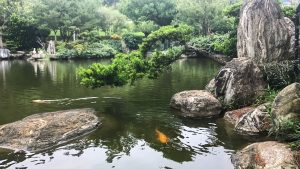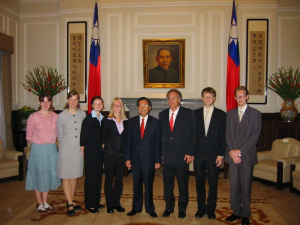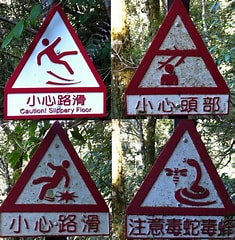
The Study Abroad Program to Taiwan began in the summer of 2002. Our first destination in the past:
Allons! the road is before us! It is safe–I have tried it–my own feet have tried it well–be not detain'd! Let the paper remain on the desk unwritten, and the book on the shelf unopen'd! Walt Whitman.
THE GRAND HOTEL: Chiang KAI-SHEK’S NATIONALIST DYNASTY MARKER ON THE HILL
Like a huge red lacquered bureau drawer, the Grand Hotel was built on the site of the former shrine for the Japanese Emperor during the period of Japanese rule, 1895-1945.
The Hotel’s architectural design featured a nine-story building. The “nine” was an auspicious number carrying the meaning of completeness and forever lasting. Spiritually, it celebrated the birthday of the Jade Emperor, the ruler of Heaven and Earth, universally revered. The Taoists considered him their supreme god. Many Chinese Emperors enshrined the figure in their art and memorials.
From 1973-81, the Hotel was the tallest building in Taipei. The Hotel’s seclusion was reminiscent of Beijing’s Forbidden city: surrounded by a moat and guarded by a highwall. It cannot be approached on foot from the main roads or streets. The major North-South Road, named after its American benefactor, Roosevelt, is too trafficked to allow pedestrians. It forks in the middle before the hill, one lane travels around the base of the sanctuary before entering the city to the south. The other north-bound lane detours around the hill and then is sucked into a tunnel, reconnecting with its sister lane heading into town. A small spur from the these roads poses as a driveway leading the driver up layer by layer to the quad parking lot. To consider walking up this winding path filled with limousines and buses would not only be folly but nearly impossible. To prevent the unauthorized, there are sentries stationed along the way. Whether arriving or leaving, the visitor must travel officially with a vehicle. This limited access is not unlike the sumptuary rituals regarding the visits and departures by tribute bearers to the emperor’s
palace.
American students in 1961 composed a satirical song entitled “The KMT Line” which was sung to the tune of “The Rock Island Line.” Here is a relevant verse:
“Who can say life here ain’t swell? Just look at the Grand Hotel!
The automobile has hit Taiwan. But the sedan-chair mentality lingers on.
The inside of this “ancestral temple” is, one hates to say it, “grand.” Huge rooms with high
ceilings supported by pillars in gold and red, and sweeping staircase to a spacey
mezzanine reduce the visitor to the feelings of a thankful supplicant to generosity.
The building is inviting the guest to an audience with the leader of China. But in
fact, it is propaganda for the support of Chiang Kai-shek’s regime”
The dynamic introduction to the present was when we met in the Presidential Palace in Taipei with the island’s President, Chen Shui-bian. I had been writing a biography of Ah-bian (as he was popularly called) which ended with his Mayorship of Taipei in 2000. After this, he became President of the country. Because I had interviewed him many times, he was familiar with my background.
I arranged a student meeting with him through his secretary. Since he was considered a radical independence politician who was anti-China, the secretary did not want many people, including her parents, to know about her work. We met with her at a restaurant, not in the Palace. She informed the group about the protocol for the visit. She was concerned that I was wearing shorts, and the students had summer clothes that were appropriate for Taiwan’s hot summers, but not for a photographic ceremony with President Chen.
I gave the students an allowance to buy more appropriate clothing than the summer shorts and sleeveless blouses they packed. For myself, I initially tried to rent a tuxedo or formal suit at a wedding store. They did not have my color in the tuxedo or a suitable outfit. Next, I approached the manager of our hotel. The owner was a supporter of the President. I was able to borrow a formal suit—it was the manager’s hotel outfit. Though it fit well, I had to ask the hotel’s clothing assistant to let out the waist.
The visit was very informal. We were invited to ask questions. Chen was his amiable self. Then we congregated with the President in the middle for a group photo. He also allowed us to take private pictures of his office.
We were all thrilled.
We were escorted to our next meeting which was with the Vice President. She was very formal. We were not allowed to take our pictures. We never received the pictures taken her staff.
We traveled extensively through Taiwan, visiting political leaders and investigating out-of-the-way places. For instance, in one adventure, we climbed down a steep hill to a waterfall and river. We swam around enjoying the cool from the outrageous summer heat. One student, a former swimmer, and diver wanted to dive off the waterfall. I had no idea how deep the water was. I advised her not to perform her skills. I appealed to her about how hard it would be to tell her mother how she became injured or even died. She dove and survived. We had an exceedingly tough time ascending the hill back to the road.
Another trek took us through the mountains to a large pond. We were guided by two American expatriates, a female, and a male. She was a famous scholar who advocated Taiwan’s independence from China, and he held similar but more radical views. He was a great model for the hippy who was culturally experimentally and politically radical. They brought us lunch. We stripped down to our underwear to swim. The male who was famous for his out-of-the-box personality, asked if could be naked. I did not object. In his nakedness, he joined us in swimming. Then we dressed before sitting on the rocks next to the pool. He remained naked while eating. No one objected, though a few thought it was strange. I did not take pictures!
Taiwan displayed a free atmosphere combined with its growing opulence. We stayed in a first-class hotel, vacationed at inexpensive guest houses, ate high-class cuisine, and traveled comfortably. We hit many of the sites including scenic trails, religious temples, and national monuments.
We became so deeply engaged in society that two of my students spent another summer working in the Department of Health which was researching Taiwan’s tobacco reforms. One student followed up on this interest during her return to Taiwan.
What made this trip special was the feeling that I had with my students. Their sense of enchantment with Taiwan, their excitement in the adventures, their openness to the unfamiliar, and their willingness to indulge me in my leadership wired me to play with them during these adventures as if they were my children. For a summer we had created a community of sharing, pleasure, and newly found knowledge.






Wow, what an adventure you had with your students, Richard. Taking them to meet the president and vice president of the country is extraordinary! And one of them even allowed photos (and you schooled your charges in proper etiquette; good for you). Then off on hiking, swimming and other exertions (glad your diver didn’t die; that would definitely have been an awkward phone call home). I’m sure everyone bonded and still remembers that summer with great fondness.
Betsy: for me student trips abroad or domestically were kibbutz-like: eating, laughing, evenings in the dorms and hotels, swimming, etc. However, there wks. always a very deep political and historical experience for the group. I always tried to give them a holistic experience about the society. I took many trips to East
Asia, across America, and Europe. The first one was my own tiyul in 1956 to Israel which became the inspiration for future trips.
Richard, you were an amazing teacher. The trip definitely encompassed all of Taiwan, which presented your students with a much more personal and universal glimpse of the country. No wonder they wanted to return. You were so good at introducing them to the people and places that mattered. Meeting the president with your students must have been such an honor. The picture was perfect and you looked dashing in that wonderful hotel-borrowed suit.
Thanx Richard for this fascinating story of your study time in Taiwan. As always you match your interest in the politics and history of the land with your interest in the people.
I’m reminded of a trip I took to France with my French teacher and 3 classmates one summer. On a very hot day we came upon a river where many French folks were swimming naked. We all stripped, left our clothes on the river bank, and joined them. I doubt we would have done it back home!
If you did, oh my! I once swam nude with women at a private pool in the hills behind Stanford University. Soon, there was police helicopter circling around. We dressed quickly leaving with fear and anger.
I was brought up with a backyard swimming pool. Swimming nude with friends was common.
Addendum: In elementary school, my father and I, plus all others, swam at the Los Angeles Y in the nude. The engineering reason was that the old cloth bathing suits shaded in the pool, thus jamming up the filters which had to be changed often. To my knowledge, no one complained.
What an amazing adventure. I’m sure you and your students bonded over these shared experiences. You were lucky to have experienced this adventurous community.